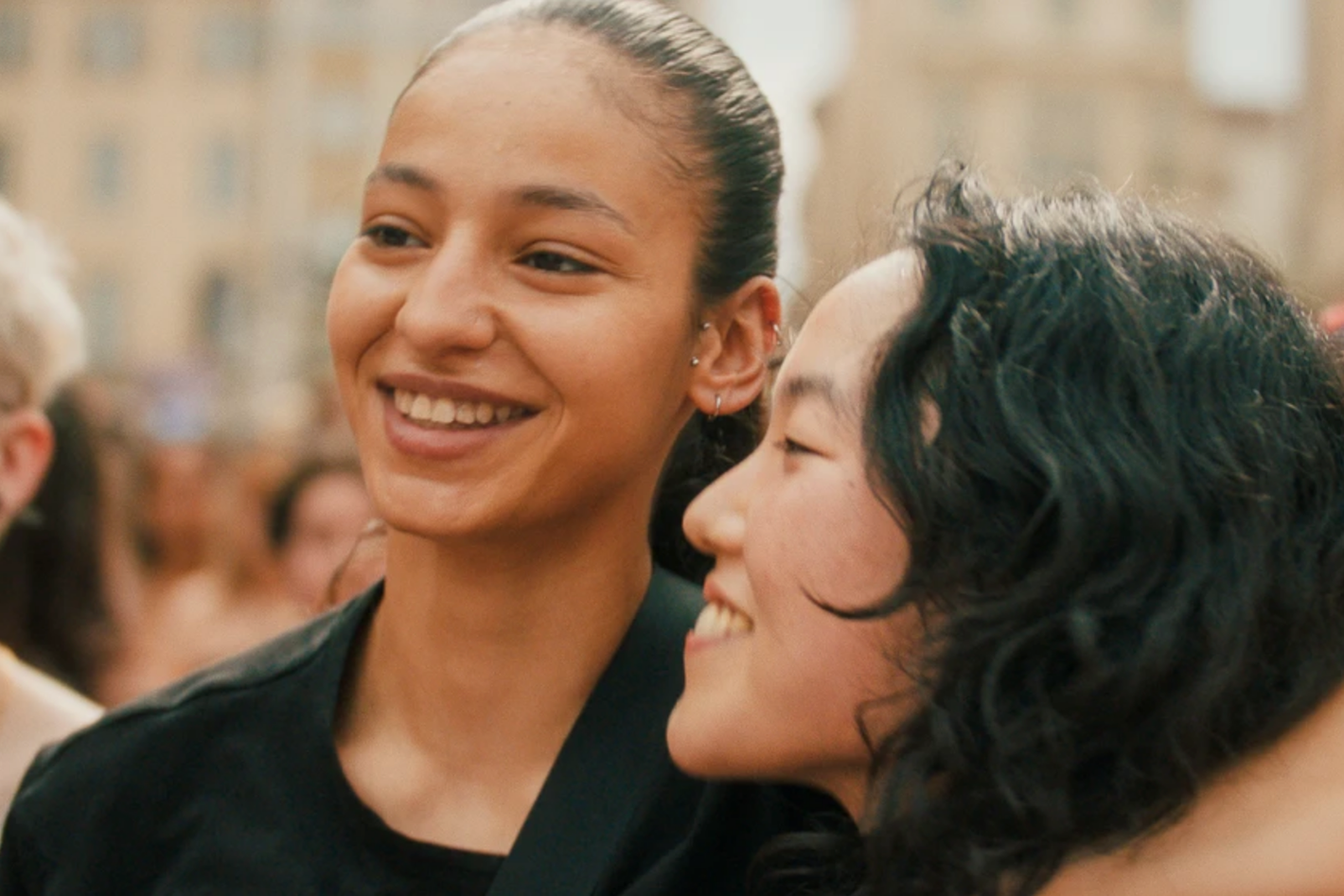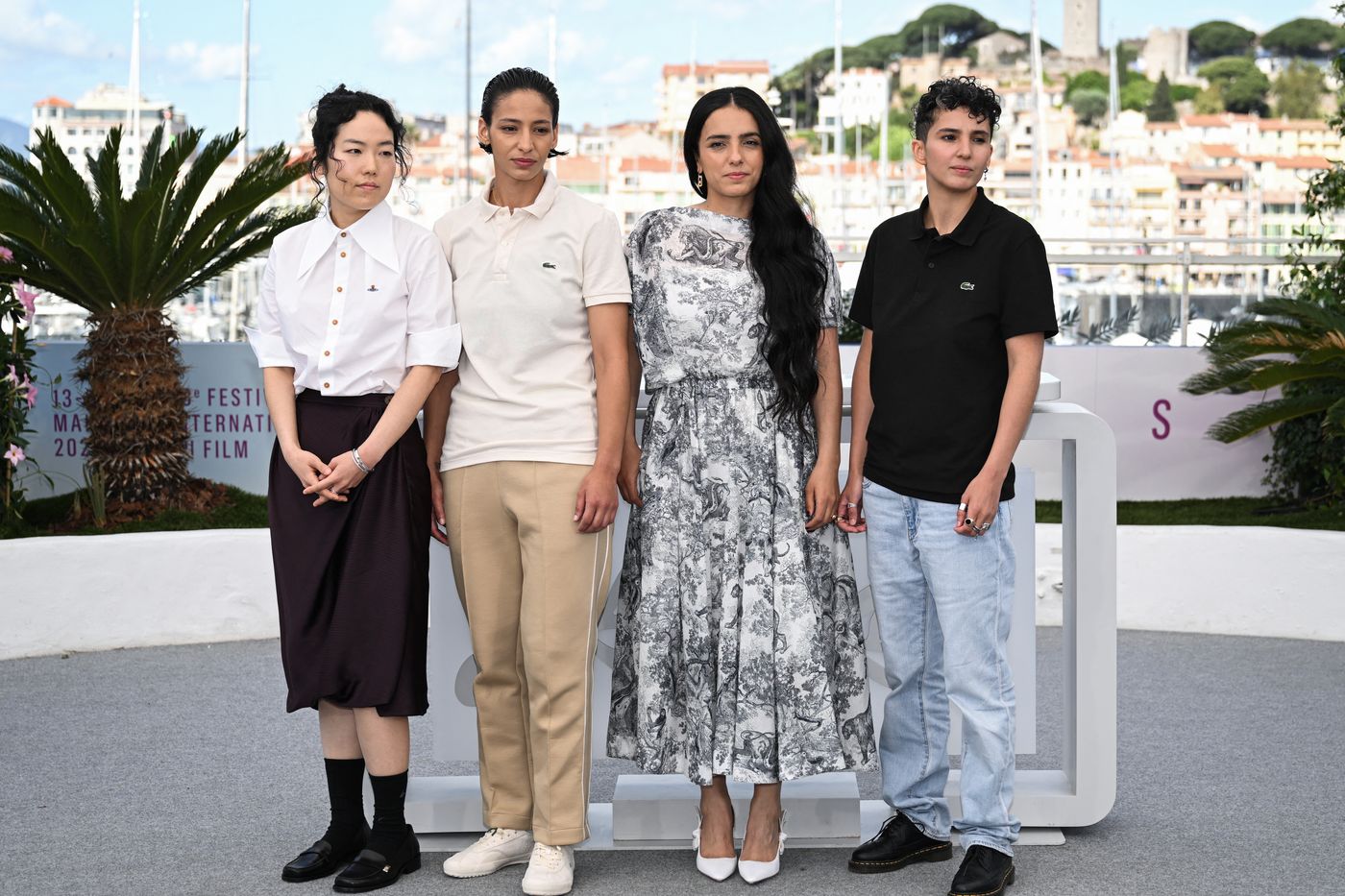The Little Sister’s Nadia Melliti Is Cannes’s Breakout Star


Here are just some of the phrases Cannes critics have used this week to describe Nadia Melliti’s star performance in The Little Sister: “Stone-cold stunner,” “gorgeously modulated body-and-soul performance,” “one of the most auspicious screen debuts I’ve seen in a while,” “the kind of talent Cannes urgently needs more of.” Melliti’s incredible turn is all the more impressive considering it’s not just her first lead role, but her first time acting. Ever. In the Cannes competition film from actor-director Hafsia Herzi, Melliti, 18, plays Fatima, a Franco-Algerian high-school senior in Paris who’s exploring her burgeoning attraction to women while hiding it from her religious Muslim family. Based on Fatima Daas’s semi-autobiographical novel The Last One, the film is a sensitive, moving, often quite sexy (a lot of all-time cinematic makeouts here) coming of age story, one that avoids a lot of the genre’s trappings in favor of something subtler and more complex.
Melliti carries the film with a performance that feels effortless and naturalistic. She spends much of it in a defensive crouch, trying to find herself while also keeping that self a secret from the people she loves most. She slowly opens up, physically and emotionally, as she comes to terms with her own desires, falls in love for the first time, gets her heart broken, and grapples with holding onto her Muslim faith while wandering outside the bounds of it. I couldn’t get over the fact that this was her first role, so I sat down with Melliti and Herzi to ask how they pulled it all off.
I’ve been reading the reviews of The Little Sister and all of them are saying you’re this breakout of Cannes. I’m curious how that has felt for you.
Nadia Melliti: I’m, of course, very happy about positive reviews, not only for myself, but for the film. And I’m happy for Hafsia and her work. I do hope that the film helps people to better understand and to ponder on certain important issues of life. It was a real labor of love for me and I put a lot of passion in what I was doing.
Could you tell me the story of you being cast? This is your first role, right?
Hafsia Herzi: The starting point for me at first was just a photograph. They started a guerilla casting all over France, and I received the photograph rather quickly after a few days. And I immediately fell in love from what came through that photograph, that image of a face.
So I asked the casting director to get in touch with a girl, and we had a couple of Zoom conversations and different screen tests done virtually. And then when I met her, it was really an artistic love at first sight. And I loved her face and what comes through that gaze. It’s almost an Egyptian profile, very unusual face and complexion.
Melliti: It was totally unexpected. I’d never dreamt of being in a film by Hafsia or by any other filmmaker. And I consider myself so lucky to be able to participate in such an artistic and talent-playing environment as the one that was created on set.
And when I was chosen by Hafsia, my first reaction was panic. I was very puzzled. “What do I do now? What do I have to learn? What do they expect from me?” So I wasn’t able to joyfully appreciate what was going on. Hafsia has been very patient for me. I even missed one appointment. I didn’t come.
You missed a callback?
Melliti: Yes, an audition. I couldn’t because something completely unexpected happened, a private life event.
Were you upset that she missed it, Hafsia?
Herzi: I was a bit sad, but I wasn’t too worried. I was very sad when I thought that she was no longer interested in being part of the film, but I waited and she came around.
Had you acted in anything before? Plays? What made you decide to do this audition?
Melliti: I’ve never done anything, never even been in a play. And Hafsia has never adapted a film from a book before. But Fatima is an author I deeply admire. And the reason I answered that audition call is that I’m curious and I just told myself, “Why not? It’s a new project.” I had the opportunity to learn something different, but I didn’t really believe that I was going to be chosen. And when they called back, I didn’t believe it either. But it’s been an extremely rewarding experience, a very enriching one. I learned a lot and hopefully this will not be my only role. I hope to be able to act again in the future, maybe again with Hafsia. That would be wonderful.

I’m curious about what your life is like and how you related to the character, if you did at all.
Melliti: We have quite a few things in common, Fatima and I, especially in the environment we come from, our origin in Rhodes. My mother is from Algeria and I have sisters myself, so I come from a similar background. Fatima also goes from secondary school to a prestigious university studying philosophy. In my case, it was not such a prestigious choice, but I also went to university. So I feel close to her in all these aspects.
Hafsia, in the film’s press notes, you said that you did research into queer lifestyles in France by going to parties. What did you learn?
Melliti: I talked a lot with Fatima, the novelist. She talked to me about a lot of different aspects, especially the clubs and the environment and how she spent her leisure time. And then, of course, I needed to go in the field myself. I went into those clubs that were a completely different universe that I thought was fantastic. I was very touched by the feeling, by the energy, by the emotion. I felt completely safe in their community. And I was sort of in scouting mode when I went there. I was with my casting director because she was selecting characters for the film at the time.
You cast people at the clubs?
Melliti: Yes, we cast many people as extras. We were warmly welcomed and supported. They were very happy about the film that we were making.
Nadia, were you going to the clubs too? What kind of research or prep did you do?
Melliti: The research that I carried out was especially made in the social family and school system, and all of that I find in myself. And it was easy. As I was saying before, we have many points in common, and all the rest was sent to my constant exchange with Fatima. I talked a lot with her, trying to dig how she felt in terms of being a very lonely person. I’m quite the opposite. I’m very open. And I learned through her how my character would react in different situations, how to translate that through the gaze and through facial expressions.
Several reviews of the film have favorably compared the sex scenes in this film to those in Blue Is the Warmest Colour. I’m curious if you can speak a bit about shooting gay sex scenes from a female gaze, versus the approach Abdellatif Kechiche took for his film, which got criticized.
Herzi: I don’t think they have anything in common, except that they are both about two women in love. To me, that’s not a reference. I do understand that people can make the association because I acted in two Kechiche films, The Secret of the Grain and Mektoub, My Love. But that was his point of view, like any other, on women’s sexuality and homosexuality. We are also two different age brackets — I am much younger than he is.
What sort of sensibility or considerations did you bring to shooting those scenes? Was there an intimacy coordinator?
Herzi: I actually proposed an intimacy coordinator to the actors, but they declined the offer. We had the choreography of those scenes very much set. I knew that I didn’t want the sex scenes to be the classic sex scene. We shot them at the very end of filming. So my camera tended to be more… to show more the faces and the mouth and the kissing and not the classic simulated sex scenes. And for instance, in the scene in the car [when Fatima’s date describes how women have sex with each other], I wanted to share the centrality of words in describing sex, which can be another way for eroticism to be expressed. The environments were very important. I wanted them to add on to eroticism and find unexpected places — a kiss exchange in the street or in the launderette. Something more unusual.

Latest News
For Sale! 2016 Sea Ray 350 Sundancer – $180,000
Reel Deal Yacht is pleased to feature a meticulously maintained 2016 Sea...
Swan 128 Yacht ‘Be Cool’ Makes Its Debut: Sunday Superyacht Showcase
The Swan 128 Yacht: Be Cool Makes Waves On May 14, 2023,...
Ferretti Yachts vs. Sunseeker A Tale of Two Icons in Motion
In the upper echelons of yachting, ownership is not just acquisition—it’s alignment....
Supreme Court orders Maine House to restore vote of GOP lawmaker who ID-ed trans teen athlete online
The Supreme Court on Tuesday ordered the Maine legislature to count the...
Zakai Zeigler, SEC’s 2-time defensive player of year, suing NCAA to play 5th season in 5 years
Two-time Southeastern Conference defensive player of the year Zakai Zeigler is suing...














Leave a comment